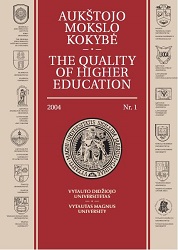Dėstymo kokybė aukštojoje mokykloje
The quality of teaching in higher education
Author(s): Robert E. Stake, Edith J. Cisneros-CohernourSubject(s): Education
Published by: Vytauto Didžiojo Universitetas
Keywords: Higher education Teaching quality faculty evaluation teacher duties competence
Summary/Abstract: Campus teaching is not independent of campus politics. Quality of teaching is partly a function of who cares. The complexity of the disciplines taught is not justification for indifference to the needs of students—and the needs of the public, and the state, and the campus administrative offices, and the instructors. Teaching is not merely a matter of communicating but also of providing opportunity to gain skills, understandings, and capacity to persevere, some of which will be outside the comprehension of some of those who teach. Campus politics today seldom mirrors the Marxist, industrialist, civil rights and anti-war battles of the past. Today’s macro-politics are driven by global economic causes, particularly the drawing of students away from work in their home communities to the technological and business centers of the more economically developed cities and countries. The micro-politics of teaching continues to be largely a matter of who gets to teach the courses they want to teach. Good quality of teaching requires attention to the choices in the lives of students, not only in academic specialization but choices about with whom they will have coffee and to what values they will commit their careers. In this paper, we support multiple evaluative efforts. We urge some but only a small amount of attention to traits and styles of instructors. We only slightly notice student outcomes. What we emphasize is instructor duty (McConney et al., 1995). We call for personal judgment of the evaluator and urge that the instructor be viewed as a member of a teaching community. Finally, partly as a political view, we oppose using personnel evaluation to standardize campus teaching. Dėstymas aukštojoje mokykloje negali būti nepriklausomas nuo aukštosios mokyklos politikos. Dėstymas ir jo kokybė iš dalies laikoma aukštajam mokslui neabejingų žmonių veikla. Disciplinų aukštojoje mokykloje sudėtingumas nepateisina abejingumo studentų, taip pat visuomenės, valstybės, aukštosios mokyklos administracijos bei dėstytojų poreikiams. Dėstymas – tai ne vien tik bendravimas, tai ir galimybių įgyti įgūdžius, supratimą ir gebėjimą atkakliai ir ištvermingai siekti tolimesnių tikslų sudarymas, nors kai kurie iš tų, kuriems šios galimybės teikiamos, ne visada sugeba suprasti tuos, kurie tokias galimybes teikia. Šiandieninė aukštosios mokyklos politika retai atspindi marksistines, industrines, pilietines ir antikarines praeities realijas. Šiandieninę bendrąją politiką lemia globalūs ekonominiai pokyčiai, skatinantys studentus ieškotis darbo ne arčiau namų, o labiau ekonomiškai išsivysčiusių miestų ir šalių technologiniuose bei verslo centruose. Dėstymo mikropolitika ir toliau didžia dalimi lemia tai, ar dėstytojas gaus dėstyti norimus kursus.
Journal: Aukštojo mokslo kokybė
- Issue Year: 2004
- Issue No: 01
- Page Range: 94-117
- Page Count: 24
- Language: English

